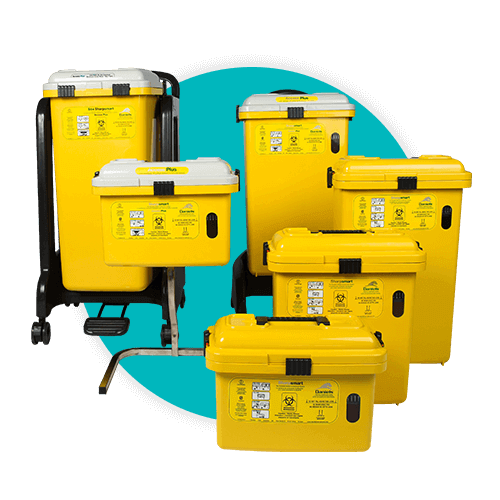Biomedical & Biohazardous Waste Disposal in Nunavut
If you grew up in Canada, you know that colouring Nunavut on a map was torture! That’s because this enormous, icy Archipelago is comprised mostly of small Arctic islands only accessible by boat or plane! So, how much of this province is actually livable? Almost Nunavut!

Okay, all jokes aside. This remote northern territory has a fascinating history and rich Inuit culture. Nunavut measures a whopping 2 million square kilometres and represents nearly 20% of Canada’s geography. There are roughly 25 communities sparsely spread throughout the region. The community of Grise Fiord, which means ‘place that never thaws’, sees temperatures plummeting as low as -50° Celsius! With such harsh winter conditions and a topography of tundra and jagged mountains, it’s no surprise there are less than 38,000 inhabitants!
Due to its location and harsh weather conditions, the Nunavut community relies on diesel for power generation. Though diesel is quite expensive and taxing on the environment, it is a useful energy source of Nunavut because it is transportable and storable. In an arctic region like this one, the risk of power and heat outages can quickly become a life threatening situation during the winter. As Canada’s two other northern provinces, Yukon and Northwest Territories, have recently limited their dependence on diesel fuel, the Nunavut government is committed to finding a sustainable alternative with less environment impact.
Nunavut is also conscious of healthcare waste-related effects on the environment. A 2008 survey by Statistic Canada showed a tendency for Canadian consumers to dispose of unused and expired pharmaceuticals in garbage, toilet, and sink receptacles. Daniels Health knows that municipal sewage treatments do not neutralise organic chemical compounds found in these drugs, thus posing a large risk to the public’s health.
Daniels Health is here to drive your healthcare waste optimisation in the efficient management of all medical and biohazardous waste streams.
As Canada's leader in biomedical waste management innovation, we don't look at healthcare waste management as a 'bag + bin + truck + treatment' model - we look at its total cost, environmental and safety impact on all aspects of a healthcare environment, including clinical staff! At Daniels we pride ourselves in innovating forward – designing reusable biomedical waste containers that minimise touche, reduce infection transfer risks, increase efficiencies, drive better segregation outcomes, and minimise costs. If there’s no transformation, w e’re no better than “the next guy”.
e’re no better than “the next guy”.
Daniels services healthcare facilities across Canada ranging from single physicians offices through to laboratories, long term care, oncology and multi-site hospitals, and is a total capability partner delivering solutions across all healthcare waste streams including sharps, cytotoxic, RCRA hazardous, pharmaceuticals, and regulated medical waste. Passionate about environmental outcomes and healthcare waste minimisation, Daniels applies its 4-walls approach to identify current behaviours within each facility we work including occupational risks, movement inefficiencies, incorrect segregation and other cost-drivers, and provide containment, location, audit and training solutions to optimise healthcare waste segregation and workplace safety.
ASK US FOR A WASTE CONSULTATION
Here are some of the benefits you can expect when you partner with us:
-
Volume reduction in sharps, biomedical waste and pharmaceutical waste
-
Eliminating risks associated with stick injuries, spills and leakages
-
Reduced risk of cross-contamination
-
A reduction in risk associated with the incorrect disposal and retrieval of medications
-
Generated waste is dealt with safely and quickly with minimal handling
-
We provide a strong suite of educational materials including eLearning modules and educational posters to promote safety and improve staff competency
-
Compliant removal of stagnant and potentially contaminated waste bins
-
Reduction in the risks of pathogen transfer with our state of the art robotic “Washsmart” systems
-
Overall improvement to labour efficiencies and redeployment of labor to patient care
Daniels Health understands the needs of healthcare facilities in Nunavut.
Contact us and see how we can help your facility better manage biomedical and biohazardous waste disposal.
888 952 5580 Request a quote


